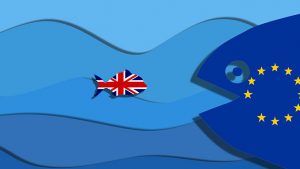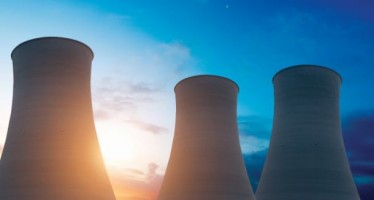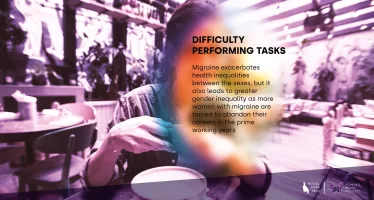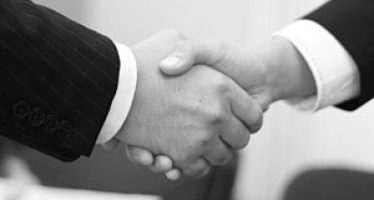Brexit: Fishing in Troubled Waters
 It’s perhaps a case of having your fish and eating it too. The number of analogies that may be rallied to describe the current standoff between the European Union and the United Kingdom over the post-Brexit assignment fish stocks is almost endless. The EU may have bigger fish to fry as it grapples with a virus and a number of restless potentates along its eastern fringes but must first deal with the odd-fish British who threaten to resolutely sail their indomitable island nation into the North Atlantic lest they get more … fish.
It’s perhaps a case of having your fish and eating it too. The number of analogies that may be rallied to describe the current standoff between the European Union and the United Kingdom over the post-Brexit assignment fish stocks is almost endless. The EU may have bigger fish to fry as it grapples with a virus and a number of restless potentates along its eastern fringes but must first deal with the odd-fish British who threaten to resolutely sail their indomitable island nation into the North Atlantic lest they get more … fish.
The talks between the EU and the UK can be said to constitute a fine kettle of fish with the French, particularly, seeking to fish in troubled waters, British cabinet members spinning fish tales, Prime Minister Boris Johnson fishing around for a fig leaf to mask any concessions, and President Emmanuel give all those looking his way the fish eye. Meanwhile, Chancellor Angela Merkel of Germany keeps to the script that calls for her to take on the role of a cold fish. She’s a natural.
Though the subject matter of the discussion supposedly holds or displays no emotions, fish tug at the heartstrings of at least eight coastal EU member states that send out fleets of trawlers, trollers, and seiners to pluck, scrape, and net the riches of the seas surrounding the British Isles. Those waters will shortly become off limits to EU-flagged vessels as the transition period expires and the UK cuts the last ties that have bound it to the European Union for well over forty years.
In the grand order of economic things and interests, fishing barely registers and does not even merit a footnote. The sector, including aquaculture, represents far less than one percent of EU GDP, employs an estimated 180,000 people, and annually fishes some 1.4 million tonnes of ‘aquatic organisms’ out of the seas. The entire fisheries value chain is calculated to be worth around €3.9 billion per year.
Small Fry
Though it may be ‘small fry’, fisheries encapsulate a traditional way of life, cherished and romanticised by many outside the industry and totemic to politicians of all stripes. Its policies impact far-flung communities. In their negotiations with the EU, the British have angled for continued tariff-free access for the Falkland Island squid that is landed at Vigo in Spain. It is estimated that more than half the calamari served in Southern Europe originates from the frigid waters surrounding the South Atlantic archipelago. Squid and other fisheries exports to the EU account for almost 50 percent of the Falkland Islands’ GDP.
EU chief negotiator Michel Barnier insists that access to waters and markets is linked. He holds strong cards: 10 out of the UK’s 15 most important export fish species depend on the EU market for 90 percent or more of their sales volume. Nature and the caprices of geography and underwater topography are also at play. Whilst nobody disputes that British waters are exceptionally bountiful, their riches spawn from the much shallower nursing grounds that line the continent’s western seaboard.
According to Clara Ulrich of the French Institute for Ocean Science (Institut Français de Recherche pour l’Exploitation de la Mer) when fish reach adulthood, they migrate to deeper, colder, and more oxygenated British waters: “This allows them to lay their eggs upstream of the current which are then whisked to the friendlier southern part of the North Sea in a natural cycle that has only been reinforced by climate change.
In Boulogne-sur-Mer, France’s largest fishing port and since Roman times a gateway to Britain, fishermen seem resigned to a no-deal outcome that will deprive the community of up to 80 percent of its catch. The locals have now turned to a new menace and scan the horizon for the expected arrival of Dutch supertrawlers which deploy nets up to a mile long to hoover up hundreds of tonnes of fish every day.
The Dutch fleet of 23 factory ships usually plies the fishing grounds around Scotland and along the English coast from Norfolk to Northumberland but may soon be looking for its catch elsewhere. Dubbed the ‘undertakers of the sea’, the Dutch are loathed in France for their obsession with industrial-scale fishing and fixation on numbers. There is nothing quaint or romantic about the Dutch fishing industry.
Stumbling Block
Fisheries have been an EU stumbling block almost since its institutional beginnings in 1957. Two countries – Norway and Iceland – withdrew their application for accession over the Common Fisheries Policy (CFP) which pools all EU waters into a single shared zone which is then divvied up between member states using mostly opaque but invariably complex formulae. Upon gaining home rule from Denmark in 1979, Greenland moved to extricate itself from the EU, becoming an OCT (overseas countries and territories) in 1985 to regain control over its maritime resources.
British cabinet members have repeatedly flaunted their ignorance on the well-established and deeply ingrained diplomatic practices of the EU by suggesting their country should receive a fishery deal similar to the ones offered to Norway, Iceland, and the Faroes. This is an impossible ask: As should have become clear after four years of negotiating Brexit, the EU is remarkably unified when it comes to dealing with third countries.
Norway, Iceland, and Liechtenstein are all part of the EU single market via their EFTA (European Free Trade Association) membership. Switzerland, also an EFTA member state, found a sui generis solution via a set of some 200 interlinked bilateral deals that effectively secures access to the single market. These countries agree with the EU on policy but not on politics and institutions. They have also chosen a pragmatic approach in their dealings with the EU, quietly delegating important parts of their actual sovereignty to Brussels whilst maintaining formal sovereignty. This also implies that quasi-EU member states accept the adjudication of any conflicts by the EFTA Court and the Surveillance Authority.
The lesson for the UK is far from complex: Single market access is awarded to those countries that manage to drift ever closer to the EU whilst sustaining a reasonable argument against direct membership such as domestic political sensitivities or, indeed, fish. EFTA/EEA countries are also – and crucially – bound to implement the EU’s four basic freedoms, pointedly including the freedom of movement. As the Swiss recently noted, there are no exceptions allowed – ever.
Life outside the EU, but in close proximity to the bloc, need not be impossible – or even hard. Norway and Switzerland show that prosperity beckons. Iceland shows that having a good friend in Brussels helps when a major crisis strikes. What EFTA/EEA members understand is that, however unreasonable a state of affairs, the big fish eats the smaller ones. Its gluttony needs to be placated in order to ensure a profitable coexistence. Once the UK has realised that it no longer is a big fish, a new and meaningful relationship between London and Brussels may eventually emerge.
You may have an interest in also reading…
Energy for the Masses: Raiders of the Lost Promise – The Holy Grail of Nuclear Fusion
All You Ever Wanted to Know about Stellarators and Tokamaks The vast amounts of energy released by splitting the atom
Women’s Brain Project: Campaign Raises Awareness of Migraine on Women’s Careers
Migraine is the leading reason for lost work days for people under 50 — and women are three times more
OECD: Ominous Signs for International Investment
By Michael Gestrin, OECD After two years of steady gains, international M&A activity plunged by $107 billion, or 45%, in


















































































